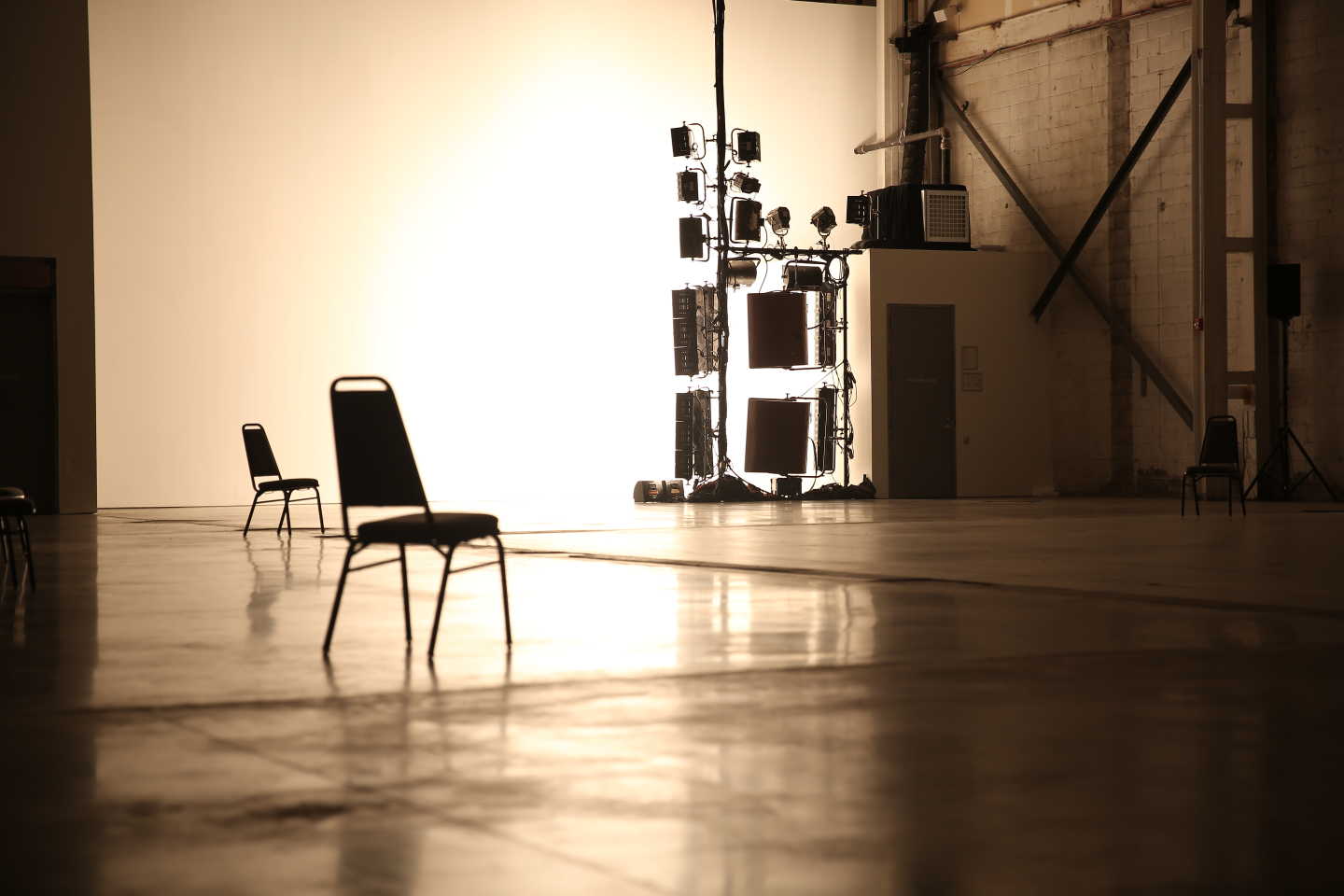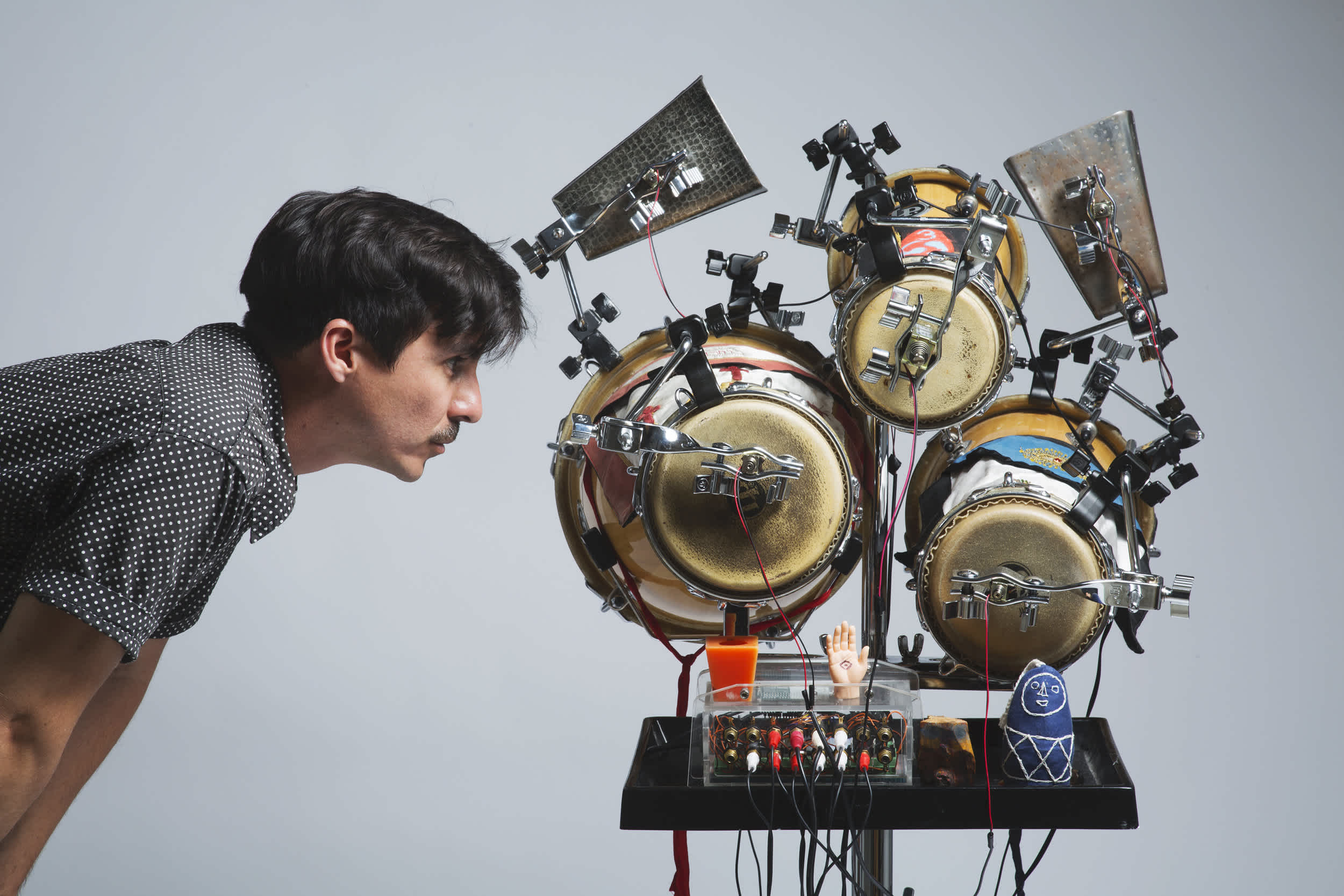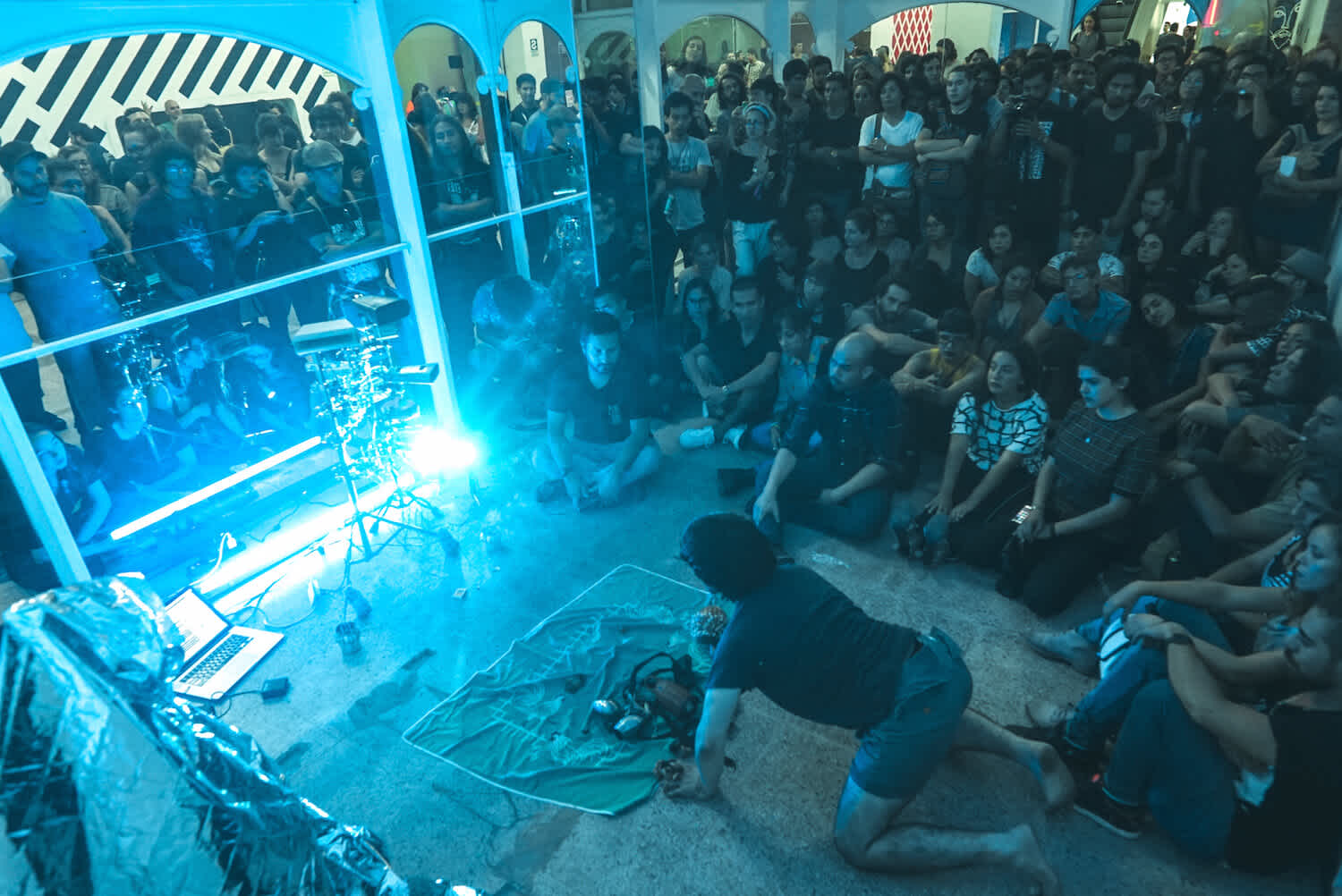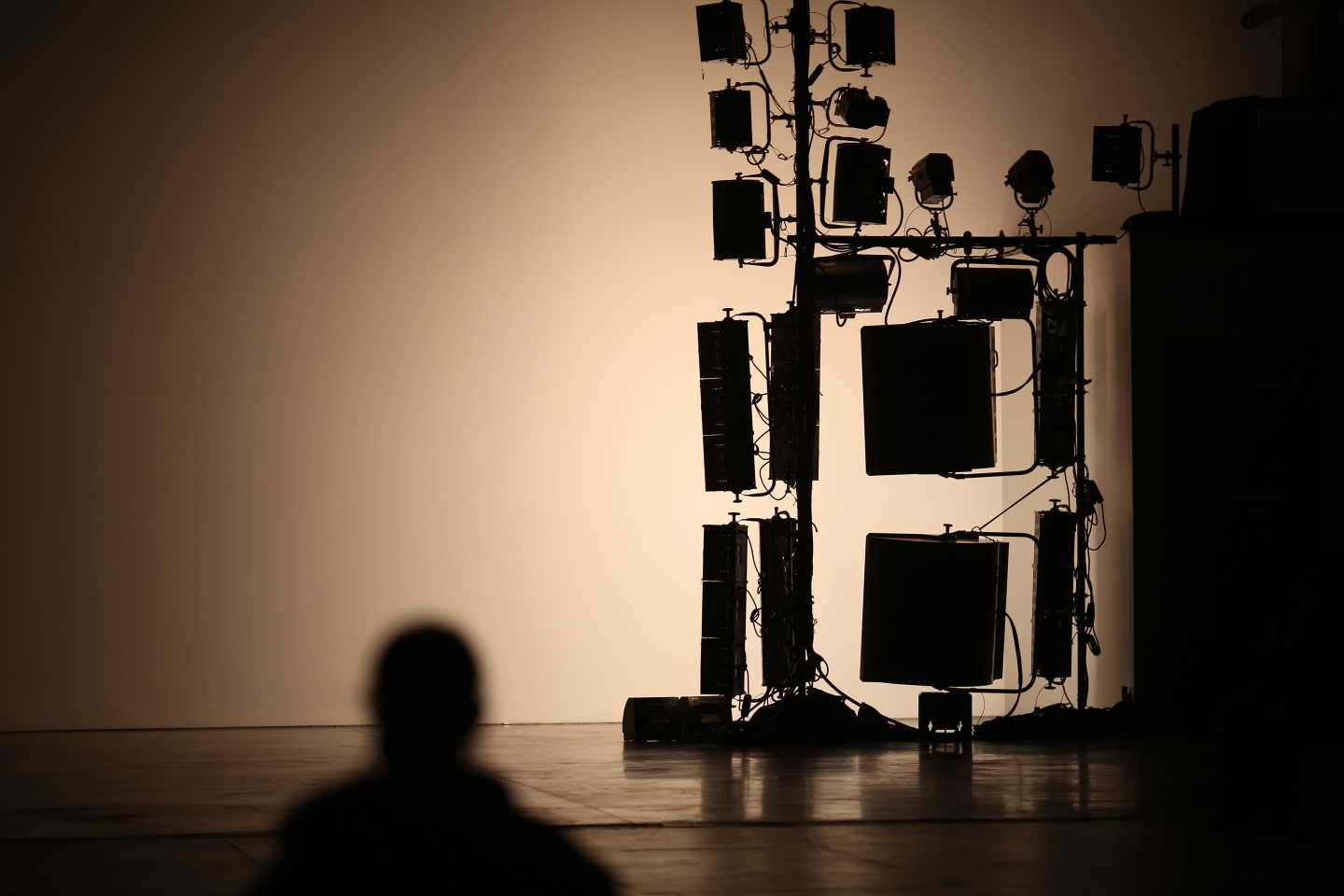
Credits:
Sherry Tseng, Winter/Spring 2021 Curatorial Intern
June 2, 2021
On April 16th – 18th, 2021, Efraín Rozas presented Still, the culmination of his residency hosted by The Kitchen at Queenslab. Rozas is a Peruvian artist—equal parts composer, performer, and software developer—who works on ideas of body, mind, and technology. Extending and stretching these ideas, the sound installation Still interrogates the structures of time, revealing them as fruits of a deeply entrenched capitalist logic and reimagining them as alternative forms.
After the conclusion of his residency, Curatorial Intern Sherry Tseng spoke with Rozas about the thought process behind and takeaways from Still.
So, to answer your question, in a shorter version: "Still" is an attempt to have another kind of silence and experience in a room A non-Western silence, without using stereotypes of non-Western culture.
Could you start by talking about Still? How would you describe it?
This installation or sound piece started during the lockdown in Lima. I was in my apartment, and I was alone in the silence in the streets. Performances were stopped, and I started thinking about questions like, “If no one sees what I do, will I continue doing it? If so, why do I do it? What is the deep motivation for it aside from people seeing it? Does everything need to have documentation? What happens with the ephemeral?”
This crisis has unveiled a lot of problems about how we live in terms of economy and ecology. In the experience of being alone in silence in Lima, I had a sense of how fragile this meaning of life was. It was a reminder to not forget that you don’t know anything. All these metanarratives and things that keep humanity going forward are very fragile. So, for me, it’s that silence of confronting that fragility of metanarrative. With a pandemic, the materiality of the real world or the non-spiritual relationships stopped, but then super quickly, everybody started to do the same things in the digital world, be that consumerism, be it a lack of ecology of information. We just reproduced all our practices instead of stopping for a bit to see what is going wrong.
We need to make deep questions of how we sense time, how we think of space, and the meaning of life. It’s not enough to criticize. A lot of the criticism of capitalism comes from a modern Western way of thinking. Even Marxism or critical thought still follows Western ideas of being, of meaning, of life, of linear time of progress. So, what if we question this? Then comes the idea of Still.

How did you think to make that transition from these ideas to something auditory?
There are two aspects of that question. First, there is a conceptual aspect that is more grounded in praxis, as a Latin American. I have an experimental salsa band. I’ve been working on robotics and new technologies, trying to do a Latin American experimentalism that allows social dance informed not by Western concepts of rhythm, but by Latin American concepts of rhythm, and my work in the last ten years has been about that.
But there is a turn now. A lot of cultural critique in these days relies on stereotypes of what is Latin American culture. Culture is a very anthropological concept and anthropology is a social science, which is a Western construct that fixates culture as an object. Even though I am criticizing the technologies that exclude certain cultural divisions, such as Latin American ones, I am still using this cultural language that is informed by Marxist thought. But Marxist thought is also a Western thought. In my work, for example, you hear the rhythm, and you think, “Oh, this is Latin America,” because of certain objectified cultural symbols. These are representations of culture as an object.
How can I talk about this discrimination, this exclusion of Latin American ways of living, without relying on Western or Eurocentric concepts of culture? So, I decided to stop using symbols or representations of my culture. One of the main aspects of being still is the management of energy and of time passing. With my salsa band, there was a favorite moment when I closed my eyes at the start of a show, and I felt the band and the room. After a while, when I felt that the band was connected with the audience in a deep way, I opened my eyes, and everybody was dancing. This is a way of being in a room, a way of being in time and space that has to do with this experience of Latin American dance that can be talked about without having to say, “This is salsa.” I am trying to talk about that management of time and space, of energy, to get to the core of this more philosophical question of: What is time? What is space?
The other aspect is linear time. As I said, linear time is common to Marxist and capitalist utopias. It influences sciences and arts. For example, Western music is informed by linear time. How so? Melody is a linear sequence of sounds. Harmony, chords, progressions have this introduction, climax, and end that is the Greek structural feature. So, I said, “OK, I’m not going to use melody, I’m not going to use one single musical note. I’m just going to use what you experience. Hearing that note in a specific space.”
Another concept of Western thought is the division of the senses. Visual art is for painting, music is for hearing, space is for sculpture, and so on. Even in interdisciplinary arts, we dismember the senses and interdisciplinary art then brings together these dismembered senses. That’s why I called it Still. Silence is from the ear. Stillness is not silence. It’s a synesthetic silence, a “silence” of all the senses. John Cage’s “silence,” for example, is the silence that is within the Western score, for the ear. On Still, I am talking about this deep silence when you’re looking in the night into the roof of your room on your bed. It’s the most strange and the most familiar. It’s this silence of bare existence that I think has to do with the ultimate questions of life that can never be answered, but they shine by the absence of intelligibility. We can relate to them only by not being able to understand. Our openness to those questions, to the things that we cannot answer rationally is a magnet that makes us make art and philosophy. This is the silence I’m talking about.
Capitalism doesn’t allow that silence. Social media and consumerism have a particular type of silence, but it’s horrendous silence. When we stop using social media, we cannot deal with that horrendous silence.
So, to answer your question, in a shorter version: Still is an attempt to have another kind of silence and experience in a room A non-Western silence, without using stereotypes of non-Western culture.
Tying back to the experience itself, how did you make use of the space at Queenslab? Why did you have the audience in a circle during the show?
I wanted people to experience existence in a pure way—just being in a room together with other people. The circle is a very primal and effective shape. It’s intimate, but with a certain distance, so you have your own experience too. I wanted people to feel the size of the space, to experience the materiality of silence, of quietness, of stillness, of the time passing, and to do it together.
The communal experience of that is a ritual. For me, I feel the need of a new language that talks about these limits of knowledge, of deep silence, of origin, death, life, time, space. Not from religion, not from New Age, but from a new language that talks about meaning of life, time, and space.
One thing that really stuck out with me is the way lights were also involved. How were you thinking about the shifts in light, and how did you envision that to correspond with the shifts in sound?
Yeah, so all the light and sound are just excuses or means to the end, which is that final silence and the experience of the room. As I was saying, in Western thought, there’s a tendency both for artists and for audiences to separate the senses. My attempt is to create an experience that isn’t even synesthetic because the concept of synesthesia assumes that the senses are separated. Any experience is always a synesthetic experience. Separating the senses is artificial. That long silence at the end of my piece is not about sound, or darkness. It’s about being in that room with other people and being aware of it. The sound and the lights are devices to put us in this moment of being and stillness.
And what is stillness? As I said, stillness is the most familiar experience and the most strange. It’s about really stopping and asking: what the hell is this? Where have we been thrown to when we were born? But we cover up this stillness in so many ways. We are afraid of it. Think capitalism and even Marxism—they all cover the most important question that doesn’t have an objective answer. And there’s nothing wrong with that. We fear the questions that don’t have an objective answer because we have forgotten to relate to things in a nonobjective way. I’m not saying that I know this non-objective relationship, but I know we need to remember it. It’s urgent actually. That doesn’t mean that it’s not knowledge. It’s just another way, another way of knowing.
Throughout the residency, you had multiple conversations—with a biologist, a philosopher, a percussionist, and a historian. How did these conversations inform your project?
These are subjects that I’ve been thinking a lot about. For me, Still was about abolishing very prevalent ideas that inform capitalism and the criticism of capitalism. For example, in the case of history, I interviewed the Peruvian historian Yukiko Takahashi about the myth of the Incas. There is the myth about them, a romanticized idea about the Incas. But the Inca state actually was an empire that was racist and dominated a lot of the population, and we have to embrace the ugly truth that there was a lot of betrayal and a lot of alliances between the Spanish nation and local enemies of the Incas.

We are talking about an empire, the Inca empire. We are talking about expert warriors. I think it’s even racist to think that an army of one hundred Spanish defeated an empire that went from Chile to Ecuador. This was a big military state. The history of human atrocity goes way before Spanish colonialism. It doesn’t deny that Western colonialism was a horrible thing, but we have to embrace the fact that the other side of racism is romanticization of non-Western cultures. Idealizing the pre-capitalist past and idealizing capitalist or Marxist futures is forcing linear time into history. Time and history are not an arrow going towards progress. Western thought has created an illusion of linear time when there are actually a lot of cyclical things, paradoxes, things that are tragic that have to be faced.
With Brian Adler, the percussionist, we talked a lot about how musics are informed by non-linear time. We talked about polyrhythm in West Africa, the drones in India, and the importance of the body as a producer of knowledge in synesthetic experiences. That was great because we shared a lot of interests.
With Carlos Carmona, we talked about how being has to do with life and death, but how we are much more than that. There are biological and emotional networks that come before our birth that are fundamental to who we are, and networks that go after our death. Ecology cannot be only based on life. Of course, birth and death are an important aspect, but it’s not only that. We have to start thinking of those limits in another way.
With philosopher Alejandra Borea, we talked about how we are objectifying life experiences and we are making them into things that can be bought or sold, quantified, and talked about in an objective form in social media. That objective way of thinking cannot answer the ultimate questions, and actually blurs and hides the questions that are at the core of a lot of the problems today. We have to question this. The problem with questioning Western thought, social media, Marxism, Capitalism, idealized pasts and futures is that we are left with emptiness, with the terrifying Western “silence.” But that is the place where we have to go if we want a real change. It’s up to us to create a new silence that is not dead, but capable of engendering new futures. We have to face it, even if it hurts.
Do you think that if we use your piece to inform how we practice our own lives, it could be compatible with how we currently live? Or do we need to completely overhaul the way we imagine ourselves?
My piece is very ambitious and very humble at the same time. Let’s start asking a question. I think we ought to start with that. It might seem useless in a way for urgent issues. But I think art and philosophy should take some time to ask these questions. This is a proposal to stop and think. I don’t think the answer has the shape of the language we have now. Science took thousands of years to develop, so just like that, there are questions that take time to answer. But we have to start asking them bravely. It takes bravery to ask a question that does not have an answer, because it puts you in a very tragic position.
Why don’t we start developing a new language? Let’s start talking about what is science and what is time. We are left with silence. But capitalism and Marxism demand an immediate action, they make us feel that silence is death, it’s terrifying. What is a silence that does not demand that, a silence that allows one to say, “OK, let’s observe. We have to learn.” Some might think I am talking about religion. But no. Let’s stop answering like that and something might happen, something new. Another way of saying things, something different. For example, when you fall in love or you have great sex for the first time. It’s another way of being in your body. It’s new… This is a new path, and let’s see where this takes me. That is another kind of knowledge related to true silence.
